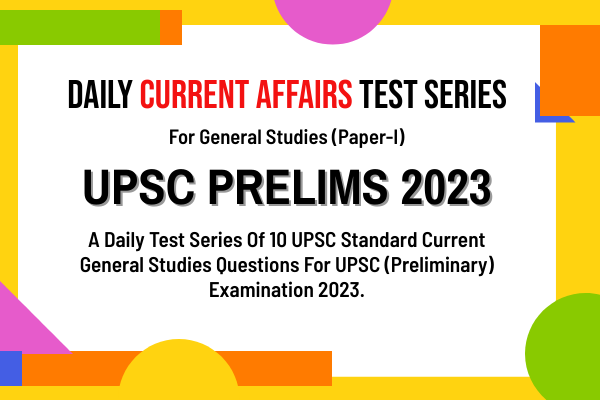Daily UPSC Prelims Current Affairs – June 10, 2022 [Mock Test]
June 10, 2022 June 10, 2022

1. Recently, new Harmonised Guidelines and Standards for Universal Accessibility has been released by the Central Public Works Department (CPWD). These will focus on which of the following aspects?
- Universal accessibility
- Barrier-free environment
Choose the correct answer using the codes given below:
[A] Only 1
[B] Only 2
[C] Both 1 & 2
[D] Neither 1 nor 2
Show Answer
Correct Answer: A [Only 1]
Notes:- New Harmonised Guidelines and Standards for Universal Accessibility has been released by theCentral Public Works Department (CPWD). These are the revised guidelines of the Harmonised Guidelines and Space Standards for Barrier-Free Built Environment for Persons with Disabilities and Elderly Persons released in 2016.
- The new guidelines focus on universal accessibility unlike the earlier ones which focuses on creating a barrier-free environment.
- Universal Accessibility refers to the degree to which the environment, products, and services are accessible to people with disabilities.
- The guidelines are not just for Persons with Disabilities (PwD), but for those involved in planning projects, from the construction of government buildings to master-planning cities.
- The nodal ministry for this is Ministry of Housing and Urban Affairs (MoHUA).
2. Consider the following statements on assessment reports (AR) released by intergovernmental panel on climate change (IPCC):
- AR4 was the scientific input for the 2009 Copenhagen climate meeting.
- AR5 formed the scientific basis for negotiations of the Paris Agreement in 2015.
- AR2 was the scientific underpinning for the Kyoto Protocol of 1997.
Which of the statements given above are correct?
[A] Only 1 & 2
[B] Only 2 & 3
[C] Only 1 & 3
[D] 1, 2 & 3
Show Answer
Correct Answer: D [1, 2 & 3]
Notes:- The IPCC is the United Nations body for assessing the science related to climate change. The IPCC was set up in 1988 by the World Meteorological Organisation (WMO) and the UN Environment Programme (UNEP). Its main activity is to prepare Assessment Reports, special reports, and methodology reports assessing the state of knowledge of climate change.
- IPCC does not itself engage in scientific research. Instead, it asks scientists from around the world to go through all the relevant scientific literature related to climate change and draw up the logical conclusions.
- Six Assessment Reports have been published so far. The first report (1990) formed the basis for the negotiation of the UN Framework Convention on Climate Change (UNFCCC) in 1992, known as the Rio Summit. AR2 (1995) was the scientific underpinning for the Kyoto Protocol of 1997. The third Assessment Report (2001) revised the projected rise in global temperatures to 1.4 to 5.8 degrees Celsius by 2100 compared to 1990. The fourth Assessment Report (2007) won the 2007 Nobel Peace Prize for IPCC. It was the scientific input for the 2009 Copenhagen climate meeting. AR5 formed the scientific basis for negotiations of the Paris Agreement in 2015.
- AR6 was released in three parts, the first part of AR6 flagged more intense and frequent heat-waves, increased incidents of extreme rainfall, a dangerous rise in sea-levels, prolonged droughts, and melting glaciers and said that 1.5 degrees Celsius warming was much closer than was thought earlier, and also inevitable. The second part warned that multiple climate change-induced disasters were likely in the next two decades even if strong action was taken to reduce the emissions of greenhouse gases.
3. Which of the following pairs of portals and respective subject matters are matched correctly?
- Broadcast Seva Portal – ease of doing business
- Jan Samarth Portal – linking credit schemes
- Yuktdhara – facilitating new MGNREGA assets
- CPGRAMS – redressal of grievances
Choose the correct answer using the codes given below:
[A] Only 1 & 2
[B] Only 2, 3 & 4
[C] Only 1, 3 & 4
[D] 1, 2, 3 & 4
Show Answer
Correct Answer: D [1, 2, 3 & 4]
Notes:- The Broadcast Seva Portalwas developed by the Ministry of Information and Broadcasting to improve the convenience of doing business in the broadcast industry. This will be an online portal option for broadcasters to quickly file and process applications for various types of licences, permissions, registrations, and other things.
- Jan Samarth Portal is a one-stop digital portal that links the government credit schemes. It connects beneficiaries directly to the lenders. The idea behind launching this portal is to encourage inclusive growth and development of several sectors.
- The Union Ministry of Rural Development and Panchayati Raj has launched a new geospatial planning portal, ‘Yuktdhara’, which will help in facilitating new MGNREGA assets using remote sensing and geographic information system-based data.
- CPGRAMS is an online web-enabled system that primarily aims to enable submission of grievances by the aggrieved citizens from anywhere and anytime (24×7) basis to Ministries/ Departments/ Organisations who scrutinize and take action for speedy and favorable redress of these grievances. The application has been launched with the combined efforts of the Defence research Development Organisation (DRDO) under the Ministry of Defence and IIT Kanpur.


